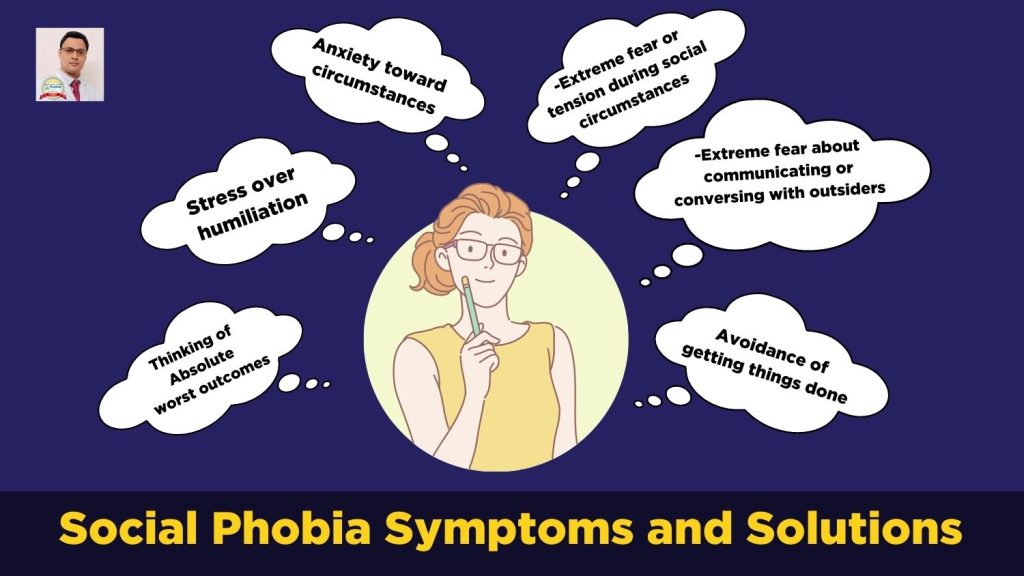
Introduction
People with social phobia experience huge and constant anxiety toward social or performance-related circumstances in which there is the chance of becoming humiliated, rejected or scrutinized.
Although they realize their fear is nonsensical, they just can’t effectively stop it, so they either keep away from these circumstances or get past them while feeling extreme nervousness and pain.
Thus, the social phobia problem extends beyond everyday shyness and can be extremely weakening.
Symptoms of Social phobia
Physical Symptoms
The actual symptoms of Social phobia can be incredibly distressing. Some of the common physical symptoms include:
- Blurred vision
- Becoming flushed
- Chest Pain
- Chest snugness
- Chills
- Looseness of the bowels
- Wooziness
- Dry mouth
- Headaches
- Heart beating (palpitations)
- Heart dashing (tachycardia)
- Bump in the throat
- Muscle pressure
- Sickness
- Shivering
- Ringing in the ears
- Shaking
- Sweating
- Shaking voice
For certain individuals, these actual symptoms might turn out to be so serious and can turn into panic attacks.
Nonetheless, not at all like those with alarm problems, individuals with social phobia know that their panic is incited by fears of social and performance-related circumstances rather than fears about the panic attacks themselves.
Emotional and Behavioral symptoms
Signs and symptoms of social phobia problem include:
-Anxiety toward circumstances in which you might be judged adversely
-Stress over humiliating or embarrassing yourself
-Extreme fear about communicating or conversing with outsiders
-Fear that others will see that you look restless
-Anxiety toward physical symptoms that might cause you humiliation, for example, becoming flushed, perspiring, shuddering or having an insecure voice
-Avoidance of getting things done or addressing individuals out of fear of humiliation
-Fear of circumstances where you may be the focal point of consideration
-Tension fully expecting a dreaded movement or occasion
-Extreme fear or tension during social circumstances
-Analysis of your presentation and recognizable proof of defects in your connections after a social circumstance
-Thinking of absolute worst outcomes during a social circumstance
-For kids, tension about communicating with grown-ups or friends might be shown by crying, having fits, sticking to guardians or avoiding talking in friendly circumstances.
Risk factors
Temperament
Negative Emotional responses are more frequent and serious in restless kids, as well as challenges in reappraisal according to negative emotional situations.
These youngsters trust more emotional regulation techniques. All of that can prompt useful debilitation, serious negative feelings, and disturbing in emotion regulation self-adequacy.
Work demands
Social phobia problem symptoms regularly start in the high school years, yet meeting new individuals, giving a speech in public or making a significant work presentation might trigger symptoms interestingly.
Negative experience
Kids who experience teasing, harassing, dismissal, criticism or embarrassment might be more inclined to social uneasiness.
Also, other adverse occasions throughout everyday life, for example, family conflict, trauma or misuse, might be related to this social phobia.
Preventions of social phobia
It’s absolutely impossible to anticipate what will make somebody develop a social phobia problem, yet you can find ways to decrease the effect of symptoms assuming that you’re restless:
Keep a diary
Monitoring your own life can assist you and your psychological wellness proficient with distinguishing what’s causing you stress and what appears to assist you with feeling good.
Put forth boundaries in your day to day existence. You can diminish tension by cautiously dealing with your time and energy.
Keep away from unhealthy substance use.
Liquor and medication use and even caffeine or nicotine use can cause or deteriorate uneasiness. Assuming you’re dependent on any of these, stopping consuming these substances can make you restless.
If you can’t stop all alone, see your medical services supplier or observe a therapy program or care group to help you.
When to See a Doctor?
In the event that you live with social phobia, you might puzzle over whether your symptoms are serious enough for you to be determined to have social uneasiness issues (SAD).
It might very well be difficult to tell whether what you are encountering is an ailment that can be analyzed.
As a guideline, in the event that the symptoms you are encountering are essentially influencing parts of your day to day routine like relationships, work, or school in a negative manner or you wind up keeping away from circumstances in view of tension, a visit to the specialist might be all together.
Bottom line
Although anxiety and fear in public are quite normal, you might still feel that you’re distant from everyone else or that you can’t get better. This couldn’t possibly be more off-base.
Our social phobia Treatments can assist you with defeating your fear. You can begin with home cures like exercise and profound relaxation.
However, if these don’t work, talk with our expert doctors about professionally prescribed medicine or counselling.
Our Mental wellbeing experts can assist you with adapting to uneasiness and becoming more sociable.
Why Choose Us?
Our motto is to provide the best results that include high quality and advanced social phobia Treatments meticulously designed for each individual.
We offer the best quality treatments in Jaipur by highly qualified doctors. Dr Sanjay Jain is a highly qualified geriatric psychiatrist and a renowned sexologist in Jaipur.
Our Treatment
We know that each individual is different, and that’s why we make sure to provide customized social phobia treatments for each individual.
We offer budget-friendly therapies, including all the required amenities for the best results.
Also, read these
Depression, OCD, Schizophrenia, Anxiety Disorder